They say if you can’t find the product you need, you should make it yourself. These three Austin entrepreneurs and moms took that advice to heart as they started and scaled their businesses, one even making an appearance on ABC’s Shark Tank.
From organic baby food to natural body products and a portable floor surface, each of the entrepreneurs behind these products traces her inspiration back to an unfilled need she saw with her own kids, proving necessity truly is the mother of invention.
By Susan Johnston Taylor, Photos courtesy of Lauren Logan Photography, Courtney Runn, Primal Pit Paste, Monkey Mat and 12 ELMS
Caroline Freedman, NurturMe
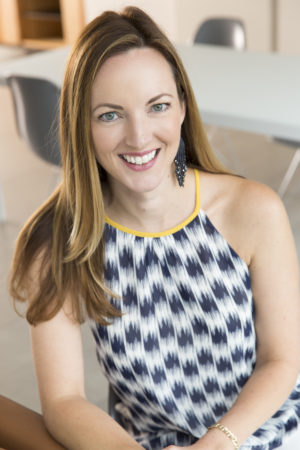 In May 2008, Caroline Freedman was pregnant with her daughter and working in global business operations for Dell. The mom-to-be was interested in entrepreneurship but hadn’t found that idea that really excited her yet. Then inspiration struck as she looked at baby food, which was then still mostly pureed food in jars.
In May 2008, Caroline Freedman was pregnant with her daughter and working in global business operations for Dell. The mom-to-be was interested in entrepreneurship but hadn’t found that idea that really excited her yet. Then inspiration struck as she looked at baby food, which was then still mostly pureed food in jars.
“I saw an opportunity to create a brand,” Freedman says.
Freedman was casual friends with Lauren de la Rosa, who was then a culinary-arts instructor, and the two began working on NurturMe, their organic baby-food company, while holding down full-time jobs.
“It just felt right from the start, and we worked easily together,” Freedman says of the partnership. “We would meet up on weekends and do a little task list over an 18-month period. The next thing we knew, we had a prototype.”
Although they were both first-time entrepreneurs, they already had some strong connections. De la Rosa was the roommate of Clayton Christopher, the founder of Deep Eddy Vodka and Sweet Leaf Tea.
“Having seen him order samples of teas and do focus groups, [de la Rosa]saw a lot of those early initial steps that he took and suggested some of those initial steps for us,” Freedman says.
Christopher connected the pair to others in Austin’s consumer-packaged-goods scene, and some of those people went on to become board members of NurturMe.
NurturMe’s initial product included dried organic fruits and vegetables that could be mixed with liquid to form a puree, and was picked up by Whole Foods Market in 2010 following the co-founders’ first meeting with a buyer. That’s when things started to get real for Freedman and de la Rosa. They raised a round of funding through the Central Texas Angel Network in 2011 to get the product on shelves, and after they’d raised enough money to pay themselves, they quit their full-time jobs.
“Austin is a competitive market, but I’ve always enjoyed the fundraising process,” Freedman says.
 In 2013, Freedman and de la Rosa noticed quinoa was becoming trendy and launched some quinoa-based products that proved even more popular with customers. NurturMe later branched out to include other ancient grains, including amaranth, millet and sorghum, which are all nutrient-rich and free from common allergens. In 2017, NurturMe debuted its new tagline—The Tummy-friendly Brand—shifting its focus to its products’ tummy friendliness.
In 2013, Freedman and de la Rosa noticed quinoa was becoming trendy and launched some quinoa-based products that proved even more popular with customers. NurturMe later branched out to include other ancient grains, including amaranth, millet and sorghum, which are all nutrient-rich and free from common allergens. In 2017, NurturMe debuted its new tagline—The Tummy-friendly Brand—shifting its focus to its products’ tummy friendliness.
“None of our products have any gluten, dairy, soy or eggs,” Freedman says. “We have a digestive-health thing going on, which is really unique. We’re the only brand in the baby category that has that commitment [to digestive health].”
This year, Freedman says she and de la Rosa plan to expand beyond the baby aisle with products for all ages, including a dairy-free yogurt alternative.
“That evolution that’s come about is due to what our customers dictated,” Freedman says.
As the company’s products have evolved, its distribution has grown.
“2017 was the rst year we penetrated that top tier of retailers like Target, Kroger and Sam’s Club,” Freedman says. “We’re still focused on getting into more accounts. We really see a huge opportunity on e-commerce, but we’ve had more of a focus on brick-and-mortar stores too.”
So, what’s her advice for other entrepreneurs? “Planning your cash flow is critical,” she says. “Funding usually takes longer [than you expect]and there are a lot of twists and turns. … You never want to back yourself into a corner where you’re out of money and taking whatever you can.”
Amy Perez, Primal Pit Paste
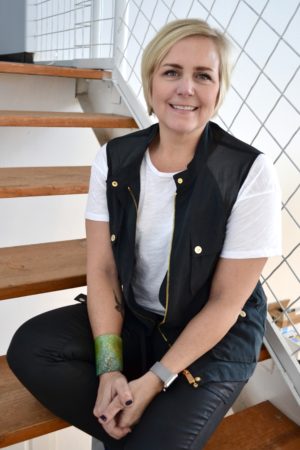 When Amy Perez’s third-grade daughter developed a noticeable body odor, the mom and CrossFit trainer didn’t want her daughter using a conventional aluminum-based deodorant since those products have been tied to serious health issues, including cancer. However, Perez also couldn’t find a natural deodorant at a health-food store that worked for more than two hours. She started making natural deodorant in her home kitchen and giving away the leftovers to the CrossFit athletes she trained, who loved the fact it lasted for 24 hours with food-grade ingredients and no chemicals.
When Amy Perez’s third-grade daughter developed a noticeable body odor, the mom and CrossFit trainer didn’t want her daughter using a conventional aluminum-based deodorant since those products have been tied to serious health issues, including cancer. However, Perez also couldn’t find a natural deodorant at a health-food store that worked for more than two hours. She started making natural deodorant in her home kitchen and giving away the leftovers to the CrossFit athletes she trained, who loved the fact it lasted for 24 hours with food-grade ingredients and no chemicals.
“I couldn’t afford to keep making all this deodorant and giving it away for free,” Perez says. So, she started selling it. “It really started with $100 in my kitchen.”
Primal Pit Paste incorporated in May 2012, with a boost from the Paleo and vegan communities, but the business really started to scale that September, when a blogger with an international following wrote about it and the product went viral.
Primal Pit Paste’s second product is called PoPo Powder Body Powder. Perez describes it as “odor care for down there.” The powder can also be used in diapers in place of baby powder or in shoes to absorb odors.
“Weightlifters and CrossFitters use it as a substitute for chalk [to prevent chafing in the groin area],” Perez adds. “A lot of talc has asbestos in it. We use organic arrowroot powder, organic cornstarch and powders that don’t have asbestos in it.”
The company also carries an organic lip balm called Pucker Paste and a tooth powder, but natural deodorant is its primary product.
Perez hired a team in May 2013 and moved the business into a 10,000-square-foot space in February 2014. But because her business was then operating in Florida, which regulates cosmetics as drugs, Primal Pit Paste got a one-year temporary approval to continue operating prior to getting mired in red tape behind many other companies before getting full approval. So, after considering a few other locales, including Raleigh, N.C., Perez moved her business and her family from Florida to Austin.
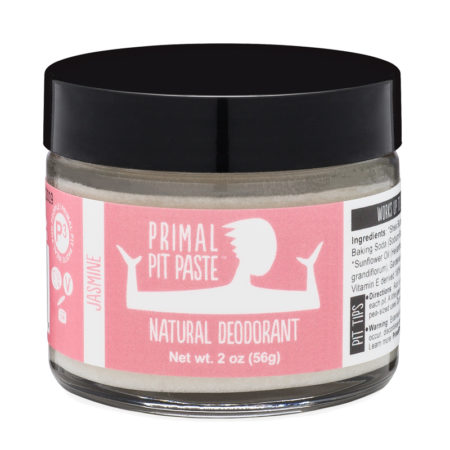 “It’s a central point of distribution,” she says. “I love Austin. I’m so glad we came here. I just had a gut feeling.” Up until that point, Primal Pit Paste had mainly sold its products online. Wal-Mart called in 2013, but Perez turned the company down.
“It’s a central point of distribution,” she says. “I love Austin. I’m so glad we came here. I just had a gut feeling.” Up until that point, Primal Pit Paste had mainly sold its products online. Wal-Mart called in 2013, but Perez turned the company down.
“I didn’t want to bite off more than we could chew for scaling,” she says. “I wanted to keep the focus on e-commerce.”
Whole Foods Market contacted Perez about six months prior to her move, and that seemed like a better fit.
“Our goal was to get into Whole Foods first before we went into more mass-market [retailers],” she says.
Primal Pit Paste is now available at Whole Foods, other health-food stores, Kroger and H-E-B, and more conversations are taking place about distribution in big-box retailers now that the company has more brand recognition.
After six years in business, Primal Pit Paste shows no signs of slowing down.
“The secret sauce really has been having a brand that people resonate with,” Perez says. “We are serious and transparent about our ingredients and won’t compromise, but we try to be relevant and fun.”
Christie Barany, Monkey Mat
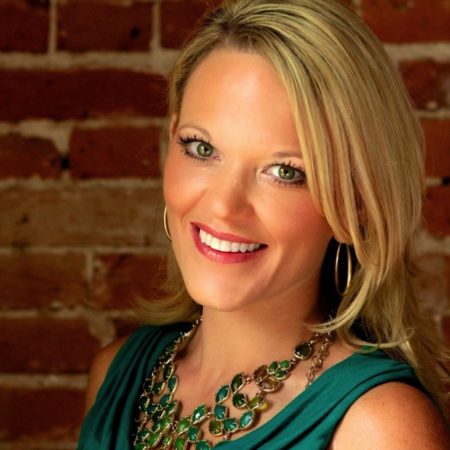 While flying with her daughters, then ages 3 and 4, in 2011, Christie Barany had to keep them entertained during a six-hour ight delay.
While flying with her daughters, then ages 3 and 4, in 2011, Christie Barany had to keep them entertained during a six-hour ight delay.
“They were crawling all over the floor,” she says of their time spent in the airport. “It was just disgusting and so, I literally started trying to find something that was portable [to cover the ground].”
Barany couldn’t find a portable blanket or portable floor surface to suit her needs, so she started brainstorming something to fill that need and shared her idea with Courtney Turich, a colleague who lived in Denver. Turich didn’t have kids but frequently went hiking, biking and camping. Barany recalls how Turich reacted to the idea.
“I would love something like [that]for my outdoor lifestyle!” she had said.
“It’s truly a collaboration to meet both mom and baby needs, as well as this outdoor, active lifestyle,” Barany says.
A former Wall Street banker, Barany was, at the time, spearheading advanced technology for a medical-device company and taking frequent business trips. Suffice to say, she and her family needed a change of pace.
“My mom passed away very suddenly, and one of her mantras had been ‘Do what you love and try to find that balance,’ ” Barany says. “I realized I was completely out of balance.”
She remembers thinking, “There’s an opportunity here. There’s a need for my family to redefine life.” So, she took what she calls the crazy leap.
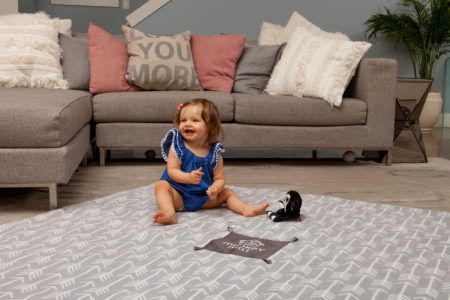 After soliciting feedback and iterating with glue-gunned or stapled prototypes, they had put together a professionally sewn version in about nine months. Barany and Turich, who’s no longer with the company, did a soft launch of the Monkey Mat in October 2012 with an email blast to friends and family.
After soliciting feedback and iterating with glue-gunned or stapled prototypes, they had put together a professionally sewn version in about nine months. Barany and Turich, who’s no longer with the company, did a soft launch of the Monkey Mat in October 2012 with an email blast to friends and family.
“It was such a funny moment,” Barany says. “We literally sat in front of a computer screen waiting for orders to start rolling in.”
The co-founders also made sales calls to small local retailers, but quickly discovered they needed product certificates they hadn’t known they needed.
“At the beginning of the process, you don’t know what you don’t know,” Barany says.
They got the certifications and continued selling to retailers.
Then, after a lengthy application process that included a 75-page handwritten application, Barany and Turich were invited to pitch Monkey Mat on ABC’s Shark Tank in July 2013, an experience Barany describes as surreal.
“The most awkward moment is you walk out, you have to stand on the X mark and you’re standing there for a full two minutes before anything actually begins,” she says. “It is the longest two minutes ever, and then the grilling begins.”
Despite the intimidation factor, the pair ended up landing an investment of $100,000 for 35 percent equity from Mark Cuban and Lori Greiner. Barany had to keep the outcome secret until the episode aired CM in April 2014.
“It was extraordinary,” she says. “Within 48 hours [of airing], we had doubled the income that we had had to date.”
Monkey Mat is now available in major retailers, including Bed Bath & Beyond, buybuy Baby and The Container Store. In addition to the Monkey Mat, which comes in a pouch for easy transport, the company also launched a Fur-eez line of pet products, including a collapsible bowl and car-seat cover.
Barany says Monkey Mat’s mission is “really about that convenience and making simple solutions to everyday problems,” adding that now she’s carrying that mission into the pet market.


